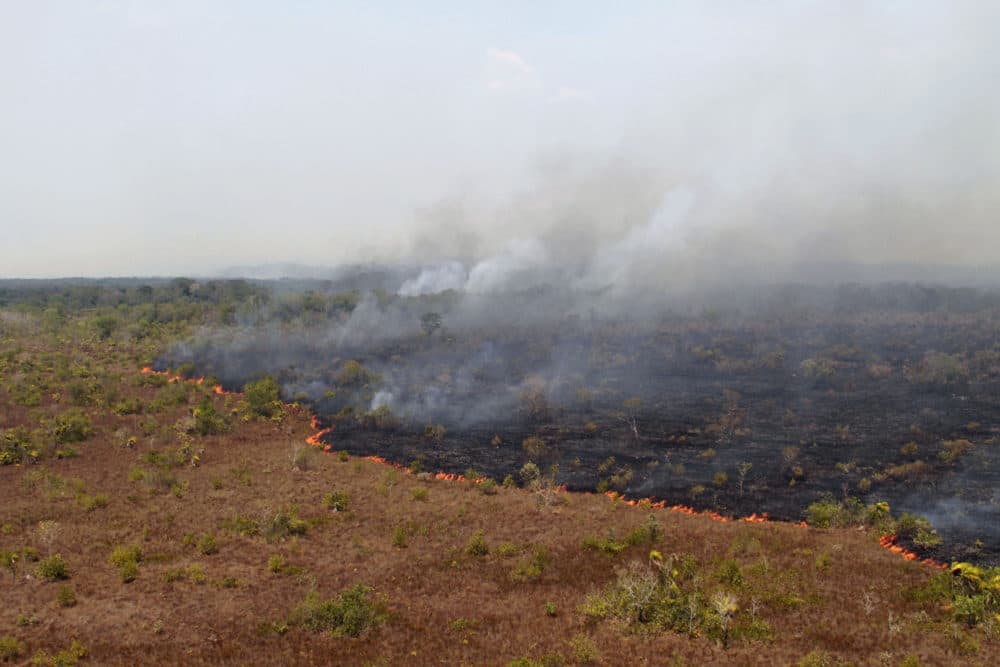Advertisement
Protecting Earth's Forests 'Just As Urgent' As Reducing Emissions, Scientists Say

A group of 40 scientists warned in a statement last month that the role of forests in combating climate change is being overlooked. The scholars say stopping deforestation is "just as urgent" as reducing emissions.
Forests' crucial role in limiting climate change — one scientists have known about for a long time now — has been given an even bigger spotlight after the release of the National Climate Assessment, which warns warming temperatures will lead to devastating health and economic impacts, as well as an October report from the U.N.'s Intergovernmental Panel on Climate Change.
Trees and soils play a pivotal role in locking up and storing carbon, says Ruth DeFries, an environmental geographer at Columbia University.
"When those forests are cleared or burned and decay, then that carbon, which would have been in the trees, enters into the atmosphere and contributes to the buildup of greenhouse gases, which is responsible for the climate change that we are seeing," DeFries (@ruthdefries) tells Here & Now’s Robin Young.
Interview Highlights
On what is causing the extreme wildfires in California, and whether thinning forests is an effective fire-prevention method
“What we're seeing with the fires out west is a combination of climate change — where there have been hotter, drier conditions, which have exacerbated the fires — and the result of a century of fire suppression. So fires have been suppressed to protect lives and protect property. But in those systems where fire is a natural element, fires naturally thin out forests, so that when fires do occur, they are less severe, and now we're seeing the combined effect of suppressing fires for so long and climate change, which is leading to these massive fires and the very devastating impacts on air quality and people's lives.”
"We want all of these efforts to go forward — the development of technologies, which can lead to negative emissions, and maintaining nature's way of doing that for free."
Ruth DeFries
On the regions of the earth most susceptible to deforestation
“Currently, deforestation is happening in the tropics. So in historical times, deforestation occurred in North America, in Europe, in the places where we now consider the industrial part of the world. But now, the deforestation focus is in the tropics, where there are the remaining large tracts of forest in Southeast Asia, in the Amazon and in Central Africa, and those are the places where deforestation is occurring primarily to make way for the production of agricultural commodities, such as palm oil and soy and clearcut for timber.
“That is the main concern ... where there's very high biomass in those forests, lots of species that lose their habitat. And when we think about where we need to focus our efforts to reduce clearing, reduce deforestation, it's in those places in the tropics.”
On carbon capture as a way to reduce the effects of climate change
“There is a lot of good work that is going on to develop technologies which can pull carbon out of the atmosphere. What we know from the IPCC report is that to achieve the target of limiting climate change to 1.5 degrees Celsius … it is necessary to have negative emissions. That means a way to pull carbon out of the atmosphere, and technologies such as carbon capture and storage and other technologies that people are working on are an important piece of that.
Advertisement
“Nature has been doing that for millions of years, through taking up carbon out of the atmosphere, through growing trees. So that is nature's way of carbon capture. We want all of these efforts to go forward — the development of technologies, which can lead to negative emissions, and maintaining nature's way of doing that for free.”
On Secretary of the Interior Ryan Zinke’s strategy to fight wildfires by rolling back restrictions on forest management
“So the issue is not that we have forests or we don't have forests. The issue is how we manage our forests. If we didn't have forests, if we cleared all the forests out, that's a little preposterous. We would have mudslides, we would have so many problems — that's not really a viable option. The issue is: How do we manage our forests? How do we allow prescribed burns or controlled thinning?
“Another aspect of living with fires and people who live on the West Coast in California … is not having development and not having people move into the places where they are in harm's way, where fires will affect them. There has been a lot of expansion into areas where fires are a natural occurrence, and restricting the places where people can be and where development can occur to protect them from fires is another aspect of the story."
On forests’ vulnerability to climate change and human development
“When we think about deforestation, the outright clearing of forests, that's an issue in the tropics, not so much in our part of the world. Forests were cleared a century ago. But currently, the outright clearing — where we have such high biomass forests — is in the tropics, where we have expansion of production of agricultural commodities. And that's a different set of issues, a different kind of thinking about the management and policies to control that deforestation."
Savannah Maher produced and edited this interview for broadcast. Jackson Cote adapted it for the web.
This segment aired on November 27, 2018.
